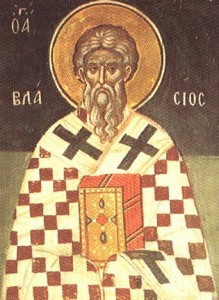One of the virtues which all Christians are called to strive for is that of “selflessness” – concern for others more than for self, attention to the needs of those around us before our own needs. St. Blaise (Blase, Blasius) showed such unselfish pity and concern that we look to him for an example today.
Although many of the historical details of his life are uncertain, it is believed that Blaise was born in Cappadocia, that he studied philosophy and medicine as a young man, and that he was a devout Christian from his childhood. He was living in the city of Sebaste, in Armenia, and practicing his healing art when the bishop of that city died and Blaise was chosen to succeed him. Now his task was to lead his people to spiritual healing, as before, he had helped them physically.
When the Emperor Licinius commanded that the Christians of the Empire be sought out for persecution (and execution if they did not recant their beliefs), Agricolaus, the governor of Cappadocia and Armenia, carried out the command zealously. Bishop Blaise comforted and ministered to his people in this time of trial. The bishop went to live in a cave on the mountain of Argeos, where he cared not only for the people who came to him, but also for domestic animals in the area and for wild animals that became tame in his presence.
Eventually, the governor’s soldiers found the bishop and brought him to prison. On the way there, at a time when most people would have been afraid and thinking only of how to save themselves, the holy man was once more called upon to think of others first. A mother ran to the bishop with her young son, who ws choking on something caught in his throat. The physician of body and soul saved the boy from death and then proceeded to his own death. He refused to renounce his love for our Lord Jesus Christ and, after much torture, was beheaded. This was in the year 316.
The people of Sebaste remembered the sacrificial life of their beloved bishop and eventually the whole world learned of his gifts and his deeds. In later centuries, the saint became known as one of the “Fourteen Holy Helpers” who intercede for us, especially against various diseases. The prayers of St. Blaise are invoked for the health of domestic animals, for protection from wild beasts, and particularly for people with throat ailments. On Feburary 3, the feast day of St. Blaise, throats are blessed with this prayer:
May God free thee from illness of the throat and any other illness through the intercession of the Holy Bishop and Martyr Blaise, in the Name of the Father, and of the Son, and of the Holy Spirit. Amen.
